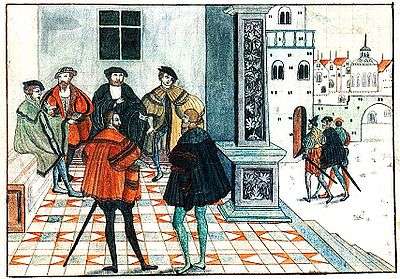First Treaty of Brömsebro (1541)
The First Treaty of Brömsebro was agreed upon in September 1541. It was an agreement between the two arch enemies Denmark-Norway and Sweden. The kings of the two countries, Christian III and Gustav I respectively, took part of the negotiations that took place in Brömsebro, a village on the border between the countries. The treaty would run for 50 years and with the treaty, Denmark-Norway and Sweden agreed upon a joined attitude against the Hanseatic League. The parties also committed to providing support when the other country was attacked by domestic or foreign enemies, which meant that Danish troops, for example, helped the Swedish king Gustav to suppress a peasant uprising (the Dacke War) the following years.[1]

The First Treaty of Brömsebro, Christian III's meeting with Gustav I in Brömsebro, 1541. (Watercolor reproduction of a lost painting made during the Swedish king's reign.)
Notes
- Eriksson, Bo (2007). Lützen 1632 (in Swedish). Stockholm: Norstedts. pp. 29–31. ISBN 978-91-7263-790-0.
gollark: With COVID-19 I finally have an excuse to not cut my hair, so I'm not cutting my hair.
gollark: Why style your hair when you could *not* do that?
gollark: We have much more bizarre stuff than the [BEE POLL] mechanism.
gollark: Great, now I can focus on the eyebleedingness of the *code*.
gollark: Dark theme is superior.
This article is issued from Wikipedia. The text is licensed under Creative Commons - Attribution - Sharealike. Additional terms may apply for the media files.